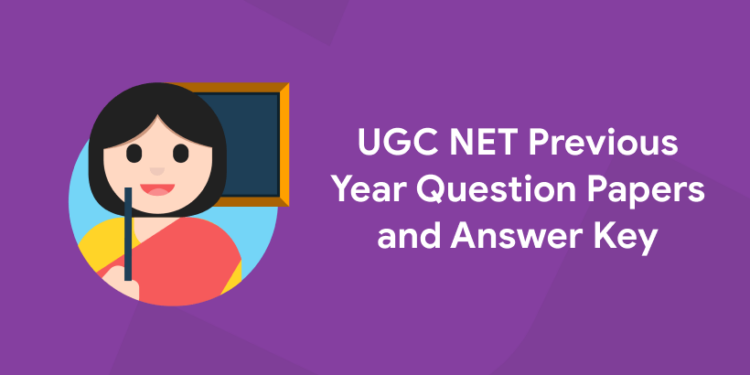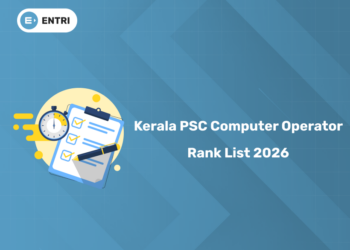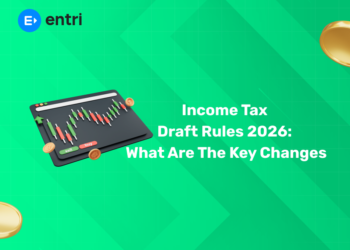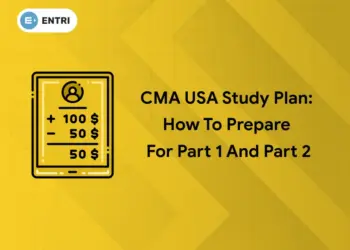Table of Contents
UGC NET is the test for determining the eligibility of the candidate for the Junior Research Fellowship (JRF) award and lectureship. UGC NET 2022 is conducted by The National Testing Agency (NTA) and the examination is usually conducted once every two years. The exam used to be held in an offline mode. But from Dec 2018, the NTA UGC NET is held in Online Mode. Every year lakhs of aspirants are applying and appearing for the NET examination as it is one of the most elite positions in the country. Clearing this examination provides the opportunity for candidates to teach in the elite institutions across the country and also a good salary. Here are some of the UGC NET Previous Year Question Papers and Answer Key for the candidates who have applied for the examination. Candidates who have applied and are preparing for the examination, please go through UGC NET Previous Year Question Papers and Answer Key.
Download Entri App! Start your UGC NET exam preparations now!
UGC NET Previous Year Question Papers and Answer Key
The given below are the subject-wise previous year question paper and answer keys for the UGC NET examination 2022.
Commerce :
|
Title |
Question Paper |
Answer Key |
| UGC NET Commerce Paper II December 2012 | Question Paper | Answer Key |
| UGC NET Commerce Paper III December 2012 | Question Paper | Answer Key |
| UGC NET Commerce Paper II December 2013 | Question Paper | Answer Key |
| UGC NET Commerce Paper III December 2013 | Question Paper | Answer Key |
| UGC NET Commerce Paper II June 2012 | Question Paper | Answer Key |
| UGC NET Commerce Paper III June 2012 | Question Paper | Answer Key |
| UGC NET Commerce Paper II June 2013 | Question Paper | Answer Key |
| UGC NET Commerce Paper III June 2013 | Question Paper | Answer Key |
Management :
|
Title |
Question Paper |
Answer Key |
| UGC NET Management Paper II December 2012 | Question Paper | Answer Key |
| UGC NET Management Paper III December 2012 | Question Paper | Answer Key |
| UGC NET Management Paper II December 2013 | Question Paper | Answer Key |
| UGC NET Management Paper III December 2013 | Question Paper | Answer Key |
| UGC NET Management Paper II June 2012 | Question Paper | Answer Key |
| UGC NET Management Paper III June 2012 | Question Paper | Answer Key |
| UGC NET Management Paper II June 2013 | Question Paper | Answer Key |
UGC NET Model Question Papers 2022
Just like attending the previous year’s question papers, attending the UGC NET model question appears will also help the candidates to understand and get familiarised with the kind of questions asked in the UGC NET examination. As the UGC NET examination is a very popular and widely participated recruitment examination, candidates are requested to go through a maximum number of model question papers as possible so as to get familiarised with the examination and the type of questions that are repeatedly asked. The given below are some of the UGC NET Model Question papers that the candidates can use for their UGC NET exam preparation 2022.
| KTET Exam Category | Sample Questions |
| Paper 1 Model Question Paper 1 | Download PDF |
| Paper 1 Model Question Paper 1 | Download PDF |
| Paper 1 Model Question Paper 2 | Download PDF |
UGC NET Mock Tests 2022
Candidates who are preparing for the UGC NET examination need to make their exam preparation strategic and result-oriented. For this candidates need to get familiarised with the examination, exam pattern, kind of questions asked, and the difficulty level of the examination. Mock tests can be used as a medium for this. Entri App provides mock tests covering various topics that will enable the candidates to get an idea regarding the question paper and the portions that they have to prioritize as they prepare for the examination. The given below are some of the mock tests that candidates can make use of as part of UGC NET exam preparation 2022.
Click here to download UGC NET exam study material from Entri App!
Why Prepare with UGC NET Previous Year Question Papers?
To ace the exam, one must have a meticulous understanding of the very basic concepts and the type of questions that will be asked. One of the strategies of a study preparation is to solve previous years’ question papers. Thus, it will help the candidates to understand the level of difficulty of the questions, the marking schemes, the time taken for solving the question papers etc. Here are some of the perks of solving the previous years’ question papers.
- Self Assessment
The candidates will be able to assess themselves when solving previous years question papers. They will be able to analyze their preparation level in their strong and weak areas.
- Time Management
The aspirants can manage their time efficiently if they practice solving the previous question papers. Hence, the speed and accuracy of writing the exam will improve.
- Important Topics
The candidates will get an idea of the important topics that are asked in the UGC NET exam. So, the more you solve previous question papers, the better chances you will have in cracking the exam.
- Repeated Questions
Solving more previous year question papers will give an idea of how frequently a question comes in each of the previous question papers. Thus this will make the students thorough in that topic.
Click here to attempt UGC NET Mock tests!
UGC NET Exam Pattern 2022
UGC NET examination is conducted under the supervision of CBSE and this examination follows certain examination pattern. The given below are the details that are related to the UGC NET exam pattern 2022.
The UGC NET examination 2022 consists of 2 papers. They are
- Paper 1
- Paper 2
The complete details regarding the exam structure that is followed in paper 1 and paper 2 is given below.
- The Paper I will test the candidates on areas such as teaching and research aptitude. It will comprise of topics like reasoning ability, comprehension, general awareness, and divergent thinking.
- While the Paper-II will be based on the subject selected from the 81 subjects (like Political Science, Philosophy, History, Commerce, Music, etc.) by the candidate.
- The UGC NET question paper will be objective type.
- The exam duration is of 3 hours.
- The first session will be for Paper I, where it includes 50 questions for 100 marks.
- The second session will be for Paper II. The question paper will include 100 questions for 200 marks.
| Session | Paper | Marks | No. of Qs | Duration |
| First | I | 100 | 50 | 3 Hours |
| Second | II | 200 | 100 |
UGC NET Exam Pattern for Paper I
Paper I of UGC NET will be generic and it will test the teaching aptitude and reasoning ability of the teachers.
| Sections | Number of questions | Maximum marks |
| Teaching Aptitude | 5 | 10 |
| Research Aptitude | 5 | 10 |
| Reading Comprehension | 5 | 10 |
| Communication | 5 | 10 |
| Reasoning (including Maths) | 5 | 10 |
| Logical Reasoning | 5 | 10 |
| Data Interpretation | 5 | 10 |
| Information & Communication Technology (ICT) | 5 | 10 |
| People & Environment | 5 | 10 |
| Higher Education System: Governance, Polity & Administration | 5 | 10 |
| Total | 50 | 100 |
- The questions will be objective type.
- Each question will carry 2 marks.
- Paper I will be for a duration of 1 hour.
- No negative marking for wrong answers in Paper I.
Download Entri App now! Start your government job exam preparations!
UGC NET Exam Pattern for Paper II
Paper-II of the UGC NET is going to be subject-based. The candidates will be asked questions based on the subject they choose. The paper will be objective type.
| Subject | Number of questions | Maximum marks |
| Chosen subject by the candidate | 100 | 200 |
- Each question will carry 2 marks.
- Paper-II will have a duration of 2 hours.
- No negative marking will be given for wrong answers in Paper-II.
UGC NET Syllabus 2022
UGC conducts the National Eligibility Test as two papers. Candidates who are appearing for the examination should score good marks in both papers to score a good rank in the final rank list.
Paper I syllabus
Paper I is on General Research Aptitude and Teaching skills. These are the topic that has to be covered for this section.
UGC NET Paper-I Unit wise Subjects
Unit-I: Teaching Aptitude
- Teaching: Concept, objectives, levels of teaching (memory, understanding & reflective), characteristics along with basic requirements
- Learner’s characteristics: Characteristics of adolescent & adult learners (academic, social, emotional & cognitive), individual differences
- Factors affecting teaching related to Teacher, Learner, Support material, Instructional facilities, Learning environment as well as Institution
- Methods of teaching in universities of higher learning: Teacher centered against. learner-centered methods; offline against online methods (Swayam, Swayamprabha, MOOCs, etc.).
- Teaching support system: Traditional, modern as well as ICT based
- Evaluation systems: Elements & types of evaluation, evaluation in Choice Based Credit System as in higher education, computer-based testing, innovations which take place in evaluation systems
Unit-II: In case of Research Aptitude
- Research: Meaning, Types, & characteristics, positivism as well as a post-positivist approach to research
- Methods of research: Experimental, descriptive, historical, qualitative, and quantitative methods
- Steps for conducting a research
- Thesis & article writing: Format as well as styles of referencing
- Application of ICT in the research field
- Ethical research
Unit-III: Comprehension
- A passage of text shall be given. Questions shall be asked from the passage from where it is to be answered
Unit-IV: Communication
- Communication: Meaning, types & characteristics of communication
- Effective communication: Verbal & non-verbal, inter-cultural & group communications, classroom communication
- Barriers in case of effective communication
- Mass-media & society
Unit-V: Mathematical Reasoning & Aptitude
- Types of reasoning
- Number series, letter series, codes & relationships
- Mathematical aptitude (fraction, time and distance, ratio, proportion & percentage, profit & loss, interest & discounting, averages, etc.)
Unit-VI: Logical Reasoning
- Understanding the structure of arguments: Argument forms, the structure of categorical propositions, mood & figure, formal with informal fallacies, uses of language, connotations as well as denotations of terms, the classical square of opposition
- Evaluating & distinguishing deductive & inductive reasoning
- Analogies
- Venn diagram: Simple & multiple uses for establishing the validity of arguments
- Indian Logic: Means of knowledge
- Pramanas: Pratyaksha (Perception), Anumana (Inference), Upamana (Comparison), Shabda (Verbal testimony), Arthapatti (Implication) & Anupalabddhi (Non-apprehension)
- Structure with kinds of Anumana (inference), Vyapti (invariable relation), Hetvabhasa (fallacies of inference)
Unit-VII: Data Interpretation
- Sources, acquisition & classification of data
- Quantitative & qualitative data
- Graphical representation (bar-chart, histograms, pie-chart, table-chart & line-chart) along with mapping of the required data
- Data interpretation
- Data & governance
- Unit-VIII: Information and Communication Technology (ICT)
- ICT: General abbreviations & terminology
- Basics of Internet, Intranet, E-mail, Audio & Video-conferencing
- Digital initiatives in terms of higher education
- ICT & Governance
Unit-IX: People, Development and Environment
- Development & environment: Millennium development with Sustainable development goals
- Human and environment interaction: Anthropogenic activities & their impacts on the environment
- Environmental issues: Local, regional & global; air pollution, water pollution, soil pollution, noise pollution, waste(solid, liquid, biomedical, hazardous, electronic), climate change & its socio-economic and political dimensions
- Impacts of pollutants on human health
- Natural & energy resources: Solar, Wind, Soil, Hydro, Geothermal, Biomass, Nuclear & Forests
- Natural hazards & disasters: Mitigation strategies
- Environmental Protection Act (1986), National Action Plan on Climate Change, International agreements/efforts -Montreal Protocol, Rio Summit, Convention on Biodiversity, Kyoto Protocol, Paris Agreement, International Solar Alliance
Unit-X: Higher Education System
- Institutions of higher learning & education in ancient India
- Evolution of higher learning & research in post-independence India
- Oriental, conventional & non-conventional learning programs in India
- Professional, technical along skill-based education.
- Value education & environmental education
- Policies, governance, as well as administration
Click here to know more about Govt Exams!
Paper-II Syllabus
In the paper II portion of the UGC NET examination, candidates can select an atopic as their elective from a total of 84 subjects. The details regarding the complete list of electives are available from the UGC Official website. Here are some of the most important portions as well as topics that are usually covered in Paper II of the UGC NET examination 2021.
| Names of the Subject | Important Topics of the UGC NET Paper-II 2021 |
| Commerce | Accounting along with Auditing |
| Banking & Financial Institutions | |
| Income-tax with Corporate tax Planning | |
| Business Statistics & Research Method | |
| Legal Aspects of Business for understanding business | |
| English | Fiction as well as Short Stories |
| Cultural Studies Topic | |
| Non-Fictional Prose Topic | |
| Literary Theory Post World War II – Summary | |
| Literary Criticism Topic | |
| Computer Science | Theory of Computation & Compilers |
| Data Structures with Algorithms | |
| Data Communication & Computer Networks | |
| DBMS (Database Management System) | |
| System Software and Operating System | |
| Management | Organizational Behaviour Topic |
| Human Resource Management (HRM) | |
| Business Plan & Feasibility Analysis | |
| Financial Management as well as Concept and Functions | |
| Marketing Topic | |
| Economics | Microeconomics Topic |
| Macroeconomics Topic | |
| Indian Economics | |
| Growth and Development with Economics | |
| Public Economics Topic | |
| Education | Curriculum Studies Topic |
| Research in Education Topic | |
| Teacher Education Topic | |
| Learner & Learning Process | |
| History, Politics & Economics of Educational | |
| Library Science | Research Methods Topic |
| Library Automation topic | |
| Financial Management in Libraries Topic | |
| Right to Information Act (RTI) Topic | |
| Mapping of Subjects in Library Classification Schemes – DDC, UDC as well as CC | |
| Political Science | Comparative Politics Analysis Topic |
| Political Institutions in India Topic | |
| Political Theories | |
| Governance & Public Policy in India | |
| Public Administration Topic | |
| HRM(Human Resource Management) | Collective Bargaining Topic |
| Job Analysis Topic | |
| Labour Welfare Topic | |
| Labour Legislation Topic | |
| Trade Unions Topic | |
| Law | Constitutional & Administrative Law |
| Public International Law & IHL (International Humanitarian Law) | |
| Family Law Topic | |
| Jurisprudence Law | |
| Environment & Human Rights Law |
Click here to get the latest updates on UGC NET Examination!
Candidates who wish to apply for the examination are requested to go through the complete syllabus and use the best materials for their preparation. Start your preparations for your dream government job with Entri App. We provide a wide range of courses over different government exams. Sign Up for Entri classes and ace the preparation for the government job examinations and bank examinations today itself. Entri helps you with thousands of questions. Attempt mock tests, analyze yourself and improve your success rate. We wish you all the success in your preparations.
| UGC NET Exam Information Links | |
| UGC NET Notification | UGC NET Mock Test |
| UGC NET Syllabus | UGC NET Video Course |
| UGC NET Exam date | UGC NET Study Materials |
| UGC NET Application Form | UGC NET Interview Questions |
| UGC NET Vacancy | UGC NET Job Profile |
| UGC NET Admit Card | UGC NET Salary |
| UGC NET Study Plan | UGC NET Preparation Tips and Tricks |
| UGC NET Answer key | UGC NET Result |
| UGC NET Best Books | UGC NET Cutoff |
| UGC NET Eligibility Criteria | UGC NET Exam Analysis |
| UGC NET Selection Process | |











